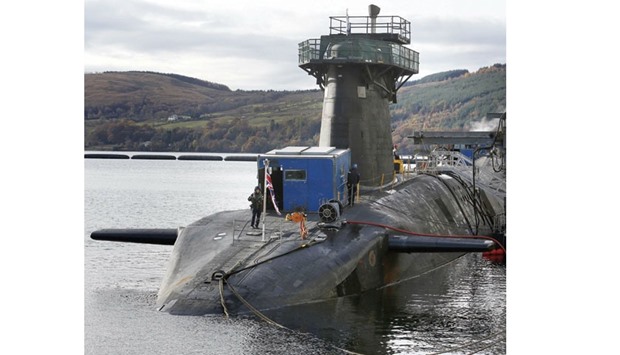
HMS Victorious berthed at the Clyde Naval Base in Scotland.
Britain must renew its submarine-borne Trident nuclear weapons system if it is to maintain its “outsized” role in world affairs, US defence secretary Ash Carter said in comments published yesterday.
A decision on replacing the ageing fleet of four submarines which carry nuclear warheads is due to be made this year and while Prime Minister David Cameron is committed to renewal, the issue has caused deep divisions in the opposition Labour Party.
The government has said replacing the submarines will cost £31bn while Reuters has puts the overall cost of renewing and maintaining a successor to Trident at more than £167bn ($234bn) over 32 years.
Carter said the submarine fleet helped the “special relationship” Britain enjoyed with the United States, the BBC said on its website.
The deterrent allowed Britain to “continue to play that outsized role on the global stage that it does because of its moral standing and its historical standing”, he was quoted as saying.
“It’s important that the military power matches that standing and so we’re very supportive of it. We depend upon the United Kingdom, the United Kingdom depends on us, that’s part of the special relationship.”
While most lawmakers in Cameron’s party support keeping nuclear weapons, Labour leader Jeremy Corbyn, a veteran left-wing and anti-war activist, supports unilateral disarmament and is holding a review of the party’s policy.
That has led to deep divisions among its lawmakers and earlier this week Labour’s home affairs spokesman Andy Burnham said it might be impossible for the party to agree a position.
The United States strongly backs Britain staying in the European Union as it gears up for a referendum on its membership, US Secretary of State John Kerry told an audience in Germany yesterday.
“Obviously, the United States has a profound interest in your success, as we do in a very strong UK staying in a strong EU,” Kerry said at the Munich Security Conference.
The British government is engaged in an intensive round of high-stakes diplomacy aimed at renegotiating the terms of Britain’s EU membership before holding an in-out referendum.
Prime Minister David Cameron is seeking to convince his 27 fellow EU leaders to back controversial reform proposals at a leaders’ summit in Brussels on February 18-19.
“The truth is, in every decade since its founding, the EU has been tested by forces — internal and external — that benefited from a house divided,” Kerry said.
“We know many Europeans feel overwhelmed by the latest round of challenges, including concerns about the UK’s potential exit from the EU.
“I want to express the confidence of the United States... that — as it has so many times before — Europe is going to emerge stronger than ever, provided it stays united and builds common responses to these challenges.”
